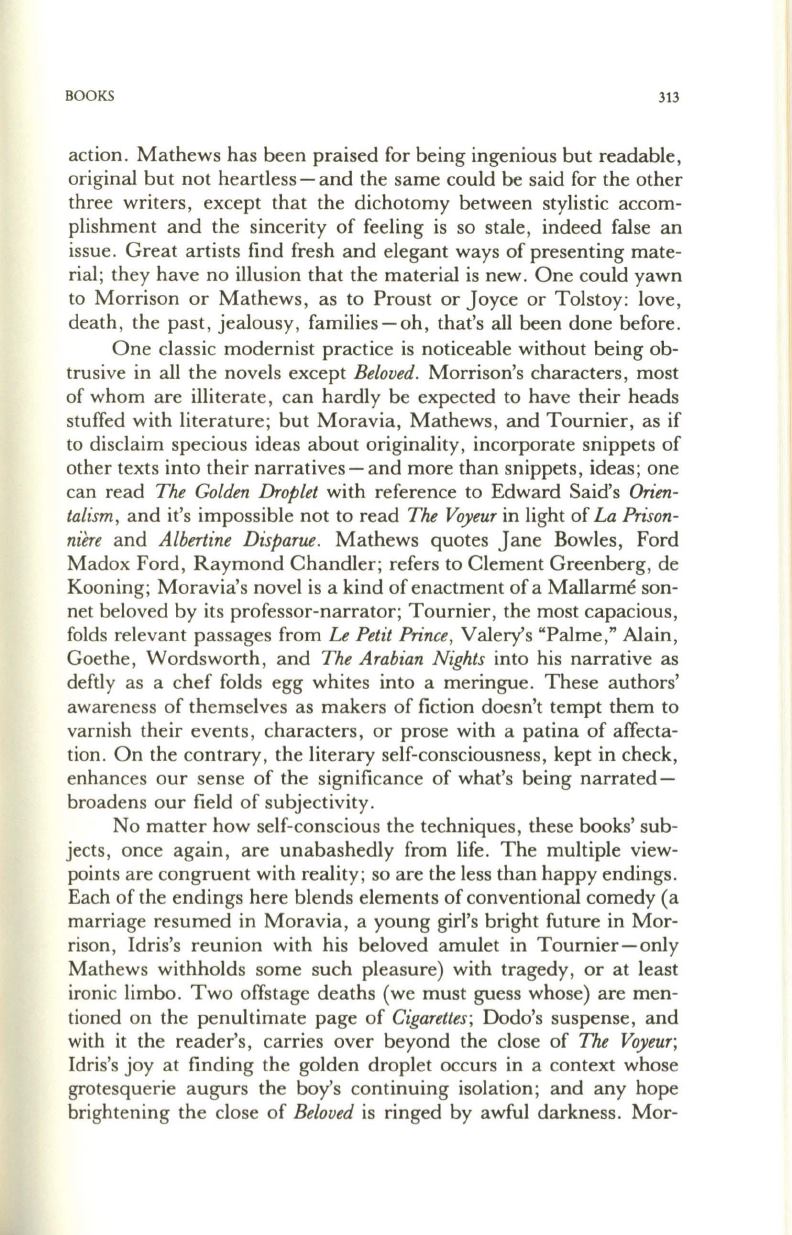
BOOKS
313
action. Mathews has been praised for being ingenious but readable,
original but not heartless - and the same could be said for the other
three writers, except that the dichotomy between stylistic accom–
plishment and the sincerity of feeling is so stale, indeed false an
issue. Great artists find fresh and elegant ways of presenting mate–
rial; they have no illusion that the material is new. One could yawn
to Morrison or Mathews, as to Proust or Joyce or Tolstoy: love ,
death , the past, jealousy, families - oh, that's all been done before.
One classic modernist practice is noticeable without being ob–
trusive in all the novels except
Beloved.
Morrison's characters, most
of whom are illiterate, can hardly be expected to have their heads
stuffed with literature ; but Moravia, Mathews, and Tournier, as if
to disclaim specious ideas about originality, incorporate snippets of
other texts into their narratives-and more than snippets, ideas; one
can read
The Golden Droplet
with reference to Edward Said's
Orien–
talism ,
and it's impossible not to read
The Voyeur
in light of
La Prison–
niere
and
Albertine Disparue .
Mathews quotes Jane Bowles, Ford
Madox Ford , Raymond Chandler; refers to Clement Greenberg, de
Kooning; Moravia's novel is a kind of enactment of a Mallarme son–
net beloved by its professor-narrator; Tournier, the most capacious ,
folds relevant passages from
Le Petit Pn'nce,
Valery's "Palme," Alain,
Goethe , Wordsworth, and
The Arabian Nights
into his narrative as
deftly as a chef folds egg whites into a meringue . These authors'
awareness of themselves as makers of fiction doesn't tempt them to
varnish their events, characters, or prose with a patina of affecta–
tion. On the contrary, the literary self-consciousness, kept in check,
enhances our sense of the significance of what's being narrated–
broadens our field of subjectivity.
No matter how self-conscious the techniques , these books' sub–
jects, once again , are unabashedly from life . The multiple view–
points are congruent with reality; so are the less than happy endings .
Each of the endings here blends elements of conventional comedy (a
marriage resumed in Moravia, a young girl's bright future in Mor–
rison , Idris's reunion with his beloved amulet in Tournier-only
Mathews withholds some such pleasure) with tragedy, or at least
ironic limbo. Two offstage deaths (we must guess whose) are men–
tioned on the penultimate page of
Cigarettes;
Dodo's suspense, and
with it the reader's, carries over beyond the close of
The Voyeur;
Idris's joy at finding the golden droplet occurs in a context whose
grotesquerie augurs the boy's continuing isolation ; and any hope
brightening the close of
Beloved
is ringed by awful darkness. Mor-


